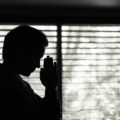Awareness of spiritual abuse in UK religious communities
Breaking the silence:
Awareness of spiritual abuse in UK religious communities
World religions have always struggled to acknowledge the existence of abuse within their communities. However, as cases of domestic violence have rapidly risen due to COVID-19, religious leaders have begun to address its existence within their communities, especially spiritual abuse.
Domestic abuse and religious communities
Throughout history, every world religion has faced challenges when addressing the existence of domestic abuse within their faith communities. Reactions to domestic abuse have varied from half-hearted acknowledgement to silence, and, at worse, complete denial that such a horrific crime could occur within their community. Academic Naomi Graetz explains how a ‘phenomenon of evasiveness’ is often upheld by religious leaders in the Jewish tradition regarding domestic abuse, a stance that is commonly taken within other religious traditions.[1]
As COVID-19 restrictions swept Europe in March 2020, victims of domestic abuse found themselves locked inside with their abusers and, tragically, cases of abuse rose exponentially.[2] Religious leaders could not ignore this evidence and within the UK, they have begun to take steps to further acknowledge abuse within their communities as well as provide support to victims.[3] An essential aspect that has further prompted the response of religious leaders within the UK has been the acknowledgement, from the late 20th century onwards, that domestic abuse is a highly complex phenomenon.[4] Leaders have begun to realise that abuse goes beyond just the physical to include emotional, psychological, sexual, financial, and, most crucial to religious communities, spiritual abuse.[5]
This having been said, this article will look both at the work being done by religious communities in the UK to raise awareness of spiritual abuse since COVID-19 began, while also reflecting on why it has taken a global pandemic for religious communities to listen to and help those suffering from spiritual abuse.
What is spiritual abuse?
In many ways, spiritual abuse can be quite difficult to define, alongside the fact that spiritual abuse is likely to be understood and manifested differently within each faith community. However, the term can be broadly defined ‘as any attempt to impair an individual’s spiritual life, spiritual self or spiritual well-being’[6] and can cause lasting damage to a victim’s ‘sense of identity, wellbeing and mental health’.[7] Examples of spiritual abuse include using religious laws and teachings to justify abuse,[8] telling someone that God hates them,[9] forcing a woman to have sex while menstruating (forbidden in conservative Judaism and Islam),[10] and criticising someone while they pray.[11]
Why has progress been so slow?
Yet, despite these highly upsetting examples, until recent years, many religious traditions have made little progress in recognising and addressing abuse within their communities, due to a variety of theological, societal, and hierarchical reasons. One of these reasons is the fact that some religious leaders deny that spiritual abuse in and of itself exists as a seperate form of abuse. For example, Lee Gatiss, director of the UK Church Society, believes that the accuracy of the term spiritual abuse is “debatable” and that it is not its own distinct form of abuse.[12] Moreover, another UK commentator suggested that “there is no such thing as spiritual abuse” and that the term is only used as a “euphemism.”[13]
Alongside those who believe that spiritual abuse is not a legitimate, individual form of abuse, there are also some religious leaders who remain silent on the issue.[14] For example, within some Muslim communities, an apparent ‘wall of silence’ is formed by preachers and community leaders that protects the abuser, while the victim becomes a target and is “ostracised for speaking out” about the suffering they experience.[15]
Moreover, there are also theological explanations that make it very challenging for spiritual abuse to be recognised. For example, in Judaism, the concept of shalom bayit (meaning ‘peace at home’ in Hebrew) is understood as domestic harmony and good relations between husband and wife.[16] Given it is a holy principle, there is great societal pressure to uphold shalom bayit which can play a significant role in stopping victims of spiritual abuse from speaking out and deterring leaders from intervening, for fear of bringing shame to their community.[17]
The tide is turning
Inevitably, reluctance or even opposition from religious leaders to acknowledge, accept, and intervene in spiritual abuse will always exist and the restrictions to progress outlined above must be taken seriously. However, within the UK, it is clear that the coronavirus pandemic has acted as a wake-up call to many religious leaders. The existence of all forms of abuse, including spiritual, has been startling and unavoidable, which has prompted some religious communities to address the issue. For example, Jewish Women’s Aid, a UK charity that supports Jewish women affected by domestic violence, launched a campaign in July 2020 entitled #AMaskWontProtect to draw attention to the increase of abuse within British Jewish communities due to the pandemic.[18] Chief Rabbi in the UK, Ephraim Mirvis, endorsed the campaign and noted that while many Jews like to believe such “illegal and shameful conduct does not afflict our Jewish community,” sadly, the reality is very different.[19]
Moreover, following the concerns of many UK Christian activists and charities that “spiritual abuse of LGBTQ+ people is a ‘ticking time bomb’ for churches in the UK,” 400 church leaders from different UK Christian denominations took part in a discussion on the issue in October 2020.[20] The discussion acknowledged the influential role of the church and the guilt it should feel for sometimes inflicting spiritual abuse of LGBTQ+ Christians or failing to properly address it.[21]
Alongside these statements made by individual religious communities, a joint statement signed by UK faith leaders in May 2020 as part of the campaign entitled #FaithsAgainstDomesticAbuse represented a significant and unified voice against abuse. Leaders from Muslim, Jewish, Christian, Hindu, and Sikh communities in the UK noted that due to COVID-19, all forms of abuse had become more widespread.[22] Moreover, they stated that while at their best, faith communities “nurture healthy relationships and strengthen society,” reports of abuse (including spiritual) from within faith communities do exist and must not be ignored.[23] This united acknowledgement of and stance against abuse is a strong and positive force that hopefully will continue to translate into effective help to victims of abuse.
What does the future hold?
It is evident that progress is being made and that awareness must continue to be raised within religious communities in order to better protect victims and prevent future cases of abuse from occurring. However, British evangelical Christian and LGBTQ+ activist Jayne Ozanne suggests that this acknowledgement needs to also be extended beyond just faith communities and that spiritual abuse needs to be officially recognised by the UK government as another form of abuse alongside “physical, sexual, emotional and neglect.”[24] Moreover, the joint statement signed by UK faith leaders stressed the need for the UK government to provide more funding for all domestic abuse services.[25] Therefore, perhaps further collaboration between faith communities and the government would be the best way for not only the UK, but also other European countries, to most efficiently tackle spiritual abuse within religious communities.
Interested in similar topics? Go to our Dashboard and get free updates.
[1] Silence is Deadly: Judaism Confronts Wifebeating – 9780765760135
[2] Domestic abuse surged in lockdown, Panorama investigation finds
[3] Women suffering domestic and spiritual abuse in lockdown, religious leaders warn
[4] Understanding the Nature and Dynamics of Domestic Violence
[5] Religious and Spiritual Abuse | lwa.org.uk
[6] Spiritual abuse: an additional dimension of abuse experienced by abused Haredi (ultraorthodox) Jewish wives
[7] Gay activist claims she was spiritually abused by evangelical churches
[9] Spiritual abuse – the next great scandal for the Church
[10] Spiritual abuse: an additional dimension of abuse experienced by abused Haredi (ultraorthodox) Jewish wives
[11] Spiritual abuse: an additional dimension of abuse experienced by abused Haredi (ultraorthodox) Jewish wives
[15] A Code of Conduct To Protect Against Spiritual Abuse
[17] Campaign warns over ‘spiritual abuse’ in the home
[18] Jewish Women’s Aid campaign highlights soaring domestic abuse during lockdown
[19] Jewish Women’s Aid campaign highlights soaring domestic abuse during lockdown
[20] UK churches urged to wake up to spiritual abuse of LGBT people
[21] Gay activist claims she was spiritually abused by evangelical churches
[22] Women suffering domestic and spiritual abuse in lockdown, religious leaders warn
[23] Women suffering domestic and spiritual abuse in lockdown, religious leaders warn
[24] Gay activist claims she was spiritually abused by evangelical churches
[25] Women suffering domestic and spiritual abuse in lockdown, religious leaders warn






